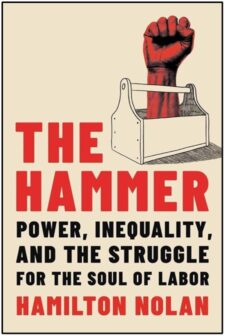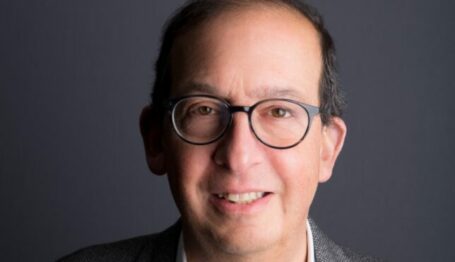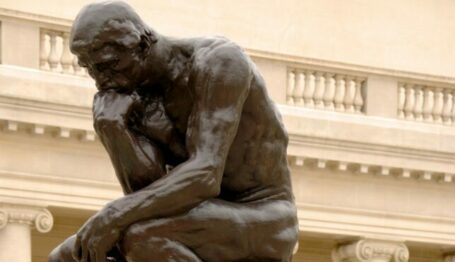Philanthropy
Philanthropy, The Hammer, and the Open Question
Labor journalist Hamilton Nolan’s new book on “the struggle for the soul of labor” takes progressive philanthropy to task for not prioritizing the promotion of America’s labor movement and makes an urgent plea for it to do more, and with more patience.


Longtime labor journalist Hamilton Nolan’s new book The Hammer: Power, Inequality, and the Struggle for the Soul of Labor is a progressive call for the weakening American labor movement to transform itself, so it can acquire more power, revamp U.S. politics itself, and reduce economic inequality. According to Nolan, liberal philanthropy has not prioritized the promotion of unions, and he makes an urgent plea for it to do more, and with more patience.
“It will take some billions of dollars over a number of years to build a national organizing project,” according to Nolan, who spent most of his career at Gawker and writes for In These Times and The Guardian. “In the context of the combined resources of unions in America, which are in the tens of billions, this is not an unreasonable amount of money.”
In the context of philanthropy, “Currently, labor organizing is not a major spending priority for do-gooder foundations,” Nolan continues. “Even those that do concern themselves with labor and equality tend to fund meta-labor nonprofits that produce white papers far more than the produce actual unionized workers.”
Unions themselves, moreover, don’t “use their government lobbying clout to extract money specifically for organizing.”
“Now is the time to get aggressive on both of these fronts—to think in terms of building a combined private and public revenue stream capable of funding what needs to be done,” he pleas,
rather than an unsteadily dripping faucet of internal union money that funds a tiny, inadequate portion of what needs to be done. All this revenue is just seed capital. Unions, once they are established, pay for themselves through member dues. In the long run, organizing is an investment, not an expense.
Terms Long, Short, and Right
It is refreshingly encouraging to hear any suggestion, from one of whatever worldview, that philanthropy should have a more long-term outlook—not the ambitious, “full-scale-of-human-history,”“longtermism” thinking of some “effective altruists,” mind you, but what let’s just consider the regular old, more-conventional long term of decades.
Certainly not the short term of a political election season—which sure seems to have been the outlook being taken by both big philanthropy and large-union officials who were part of, as it was described by Time’s Molly Ball, the “well-funded cabal of powerful people” that jointly engaged in a “conspiracy” to affect the 2020 presidential-election results.
But more like the long-term perspective taken by, say, Milwaukee’s conservative Lynde and Harry Bradley Foundation—with which I’m familiar from having served on its program staff—in pursuing grassroots (and cross-ideological) movements to secure a greater place for faith “in the public square” and the empowering of central-city parents to have a greater voice in the selection of where their kids will go to school, including through school choice. Decades.
True Believers and Moneyed Institutions
There is also refreshing encouragement in the anti-elitism of much of Nolan’s consonant critique of top-down “bigness” in The Hammer’s labor context. Perhaps similar to the post-pandemic “primal scream” of parents loudly and actively objecting to what was and wasn’t going on in school systems across America, though he likely wouldn’t see such an analogy, he did see—along with many progressives—“a post-pandemic labor boom” that
was like emerging from a dark cave into a daytime fireworks show. It was all going down! The party had started! Get on the dance floor or be left behind!
And what happened? Did the institutions of organized labor—the AFL-CIO, the biggest unions in America, the richest nonprofits—spring nimbly into action to guide and nurture and take absolute advantage of this newfound hunger among working people? Not at all.
Specifically, Nolan describes the experience of Felix Allen, who led a union drive at Lowe’s in New Orleans. Allen did not get any help from the big AFL-CIO, Nolan pointedly notes. Instead, Allen “spoke to some local Marxists,” Even more specifically, he “spoke to the Emergency Organizing Committee (EWOC), a group that exists to help get people in touch with union organizers—a scrappy, nonprofit joint project of the” Democratic Socialists of America and the United Electrical, Radio and Machine Workers of America (UE), “a small but radical union that has always been militantly committed to organizing and is not part of the AFL-CIO.”
“To the extent that Allen got encouragement, inspiration, and consultation, almost all of it came from a loose network of labor-adjacent, left-wing people motivated by pure ideological belief,” Nolan writes, “not from any major national group capable of identifying and assisting important worker activists like him. The true believers did the work, and the big institutions with all the money did not.”
Fortressed, Endowed, Cozy
Here too, to me, is another conceptual congruence with at least some conservative philanthropy: Bradley Foundation president Michael S. Joyce would very often counsel that grants might best be made to those who’d be engaging in their activity whether the money was given them or not—the kind of true believers earning Nolan’s admiration, in other words, the ones doing the actual work.
This may also be a conformance not easily accepted by Nolan, however. “The existence of true believers is always heartwarming, but this ad hoc arrangement is not one capable of a grand revival of organized labor at a large scale,” he then writes.
“The most-capitalized parts of the organized labor world,” Nolan continues, returning to the anti-elitism. “are, in effect, still pursuing their own inward-looking version of ‘Fortress Unionism’”—according to which labor should basically bide its time, stop trying to launch difficult and expensive organizing campaigns, and conserve resources until the working class is more receptive to it and what it offers. This “even as opportunities reach new heights. But while the original theory was that these institutions would be ready to leap into action when the time was right, what has instead happened is that—predictably—they have found the walls of their fortress too cozy to leave.”
In the context of grantmaking, this sort of anti-elitism closely mirrors strong and seemingly growing discontent—on the part of both populist progressives and conservatives—with the equally well-fortressed, definitely healthily endowed, and probably as-cozy Big Philanthropy.
Possibilities, Potentialities, Prospects
From Nolan’s standpoint, the large progressive JPB Foundation under its new president Deepak Bhargava might coming to the rescue, or at least helping point the way for its philanthropic colleagues. In early February, JPB announced that it is expanding its mission and will increase its grantmaking to nearly $500 million this year, including $100 million new grants to support nonprofits focused on “strengthening democracy,” including in the long term. Many Big Philanthropy foundations say they are doing that, of course, but JBP specifically include funding projects to strengthen “community and worker power” as one of its five “key areas of work.” This has the possibility of being quite Nolan-like, it seems.
“Saving democracy will require building bridges will require building bridges across civil society to unite those who may have differing worldviews but agree on bedrock commitments such as the right to vote and the need for representative and responsive institutions,” Bhargava says in JPB’s announcement of the initiative. “We must work to meet those short-term threats to our formal democratic institutions while also addressing the long-term drivers of our crisis of democracy.
“Doing so means recognizing that a sustainable and inclusive democracy requires much more than the right to vote,” he continues.
If Bhargava is taken at his word, this may or may not also include the prosect of being quite Joyce-like, one might think. Whether it will or won’t is an open question, but being able to ask it is at least refreshingly encouraging, too.
In announcing a new Bradley Foundation grantmaking initiative in 1994, Joyce lamented the progressive redefinition of citizenship “so that it no longer means constant, everyday participation in the self-governing activities of civil society, but rather is narrowly confined solely to voting in elections—that is, to casting a ballot every now and then in order to turn public life over to the real experts in our centralized bureaucracies.”
Citizenship is more than voting, much more than mere politics, and to the degree that it might have political ramifications, they’re far from being partisan in either motive or, hopefully, effect. School choice was—and still is, moreso in the pandemic lockdown’s wake—“help[ing] people who have been denied power to build it,” as Joyce put it, and as Nolan and Bhargava say they want to do for workers.
To Joyce, this empowerment was and is very different from, if not opposed to, politics and the power it can only ineffectively fleetingly secure anyway. It opened up areas in which a private foundation could play a helpful, effective, long-term, philanthropic role, moreover; even if Bradley wanted to, and it didn’t, good and expensive lawyers were telling him a philanthropy like his couldn’t play a role in Ball/Time-like, short-term, election-driven politics in any case.
Evidence and Opportunity
In fact, as well, there is evidence that one truly seeking to broadly empower workers in particular might want to avoid politics. There also seems to be at least some opportunity to pursue just such an apolitical-empowering aim, if even only just experimentally.
“Among the non-supervisory workers at for-profit companies who say they would vote for a union,” according to an American Compass survey released last October, unions’ “involvement in politics ranks last among the reasons they would support one. Among those who say they would vote against, its involvement in politics ranks first among their reasons for oppositions,” according to the anti-Conservative, Inc., group.
Specifically, only 12% of respondents said they would vote for a union because it “Endorses and campaigns for politicians” and only 30% would vote for one because it “Leads activism for social change.” Other reasons, all of which got higher levels of support as a reason to vote for a union were to “bargain with my employer” (66%), it “Advocates for laws that benefit workers” (61%), it “Provide[s] benefits and training” (51%), it “Collaborate[s] with management” on how [the] workplace runs” (45%), and it would “Represent me in disciplinary issues” (42%).
Of many various reasons why respondents would vote against joining a union, the fact that it “Gets involved in politics” topped the list, at 70%.
In Miami right now, under a new state law passed last year, the United Teachers of Dade (UTD)—America’s third-largest teachers’ union—may soon be decertified by its members and replaced by a new union, the Miami-Dade Education Coalition (MDEC), in an election, the date of which has yet to be announced. If MDEC organizes to collect enough “showing-of-interest” petitions from teachers to participate in the election, it would run against UTC by promising to slash dues by at least two-thirds, remain politically nonpartisan, and be more responsive to the local rank and file’s wishes.
Just like the Nolan-profiled Lowe’s Allen didn’t, one doesn’t suspect that MDEC’s Brent Urbanik has gotten any help from Big Labor, either. In fact, Big Labor is strongly fighting MDEC’s anti-politicization effort, with something of a hammer. MDEC is being helped by the conservative, philanthropically supported Freedom Foundation—fully cognizant of the fact that the true-believing MDEC’ers are trying to mount an anti-politicization effort against moneyed Big Labor from within labor, through a new union, as Freedom Foundation president Aaron Withe notes.
Encouraging a Definition of Citizenship and an Empowerment of the Denied
The MDEC’ers, and perhaps many others like them doing actual work, are looking for and need some cross-ideological, movement-building empowerment. Support for such empowerment would be refreshingly encouraging—as with much of Nolan’s Joyce-like, long-term, and anti-elite thinking as presented in The Hammer and some of the language used by JPB’s Bhargava.
If even only hypothetically, such support could perhaps be seen, Nolan-like, as an investment, not an expense. Maybe, Joyce-like, as revitalizing an active citizenship—defined, Joyce- and Bhargava-like, as more than voting, and helping people who have been denied power to build it.
This article first appeared in the Giving Review on February 26, 2024.



